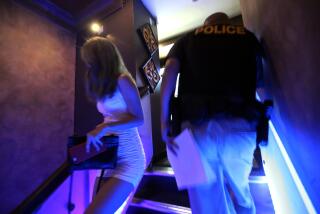German Police Crack a Curious Mickey Mouse Case : Crime: Extortionist went by the name Scrooge McDuck. He had baffled authorities--and delighted some Germans--with his witty escapades for two years.
- Share via
BERLIN — Police closed a chapter in the annals of German crime Friday with the capture of a mysterious, bomb-making extortionist who went by the remarkable nom de guerre of “Dagobert”--German for Scrooge McDuck.
Dagobert had plagued German authorities--and entertained ordinary Germans--for nearly two years, with capers ranging from the deployment of a homemade, remote-controlled rail car for picking up ransom money to police chases through the sewers of Berlin.
Dagobert was a high-tech extortionist, who specialized in inventing zany electronic devices to collect money from his department store targets at pre-selected drop sites. European comics buffs had speculated that he was taking his ideas from the exploits of Scrooge McDuck, Donald Duck’s tightfisted trillionaire uncle, drawn by the Disney artist Carl Barks. Police investigators reportedly combed about 6,000 pages of Barks’ cartoon strips in their search for clues.
More seriously, the extortionist set off five explosions at branches of the Karstadt department store chain, causing about $6 million worth of damage. No one was seriously injured, but police had warned that it was only a matter of time before an explosion maimed or killed somebody. The bomber had promised to stop the attacks if Karstadt paid him about $825,000.
Police identified their suspect Friday as Arno Funke, a 44-year-old unemployed sign-painter from what used to be West Berlin, who is married and the father of a 3-year-old son.
They said Funke confessed immediately when they captured him, while he was calling a Karstadt store from a pay phone in what used to be East Berlin. They also said they believe that he was behind an earlier, successful extortion of about $300,000 from the KaDeWe department store, Berlin’s largest, in 1988.
Until Friday, police had fumbled through more than 30 attempts to capture Dagobert at the various money-drops he proposed, at a cost to taxpayers that was rumored to be as high as $20 million. They collected about 3,000 leads, questioned more than 100 suspects and put trained dogs, anti-terrorist squads, helicopters, psychics and even astrologers on the case. They offered a $60,000 reward for information and set up a telephone line on which potential tipsters could listen to Dagobert’s voice on tape.
Michael Daleki, the Hamburg police officer who orchestrated the hunt, told the magazine Stern in February that the case was the most difficult of his career. He admitted that he had even started dreaming about Dagobert at night.
He also said that despite his frustration, he still found himself able to laugh at Dagobert.
And there was much to laugh at: In one typical episode, for instance, Berlin police staked out 2,000 downtown Berlin credit-card phone booths--the technology-loving Dagobert was believed to favor credit-card calls--only to be foiled when the bomber called in from a coin-operated pay phone in the suburbs--across the street from the Walt Disney School.
Such whimsy, as well as the massive scope of the hunt, fascinated Germans, some of whom took to sporting T-shirts with the legend, “I am Dagobert.” A telephone survey by a German broadcaster found that 61% of callers harbored “hidden sympathy” for the bomber.
Dagobert has been the subject of television shows, movie scripts, a novel, a popular song and a radio quiz show. There are even Dagobert garden gnomes, with face mask and a bundle of money.
“People are fascinated,” said Hans-Joachim Aust, a member of DONALD, a society of comic book aficionados whose name is the German acronym for the Organization of Non-Commercial Supporters of Donaldism. “There is always this kind of effect when there’s a clever guy who’s always outwitting the police.”
For all his inventiveness, Dagobert was never able to collect any money from Karstadt. In some instances his devices broke down in mid-collection. In others, he failed to show up--lapses for which he would later send polite notes of explanation. Other times he played cat-and-mouse with the police, showing up at drop sites but disappearing penniless down manholes.
After his arrest, Funke said he had been having a bad day: “I was a bit in stress, so I became a bit careless,” he said.
Said Aust: “I wish, somehow, that he had just gotten away with the money and vanished. Now it turns out he is just an ordinary human being, who makes mistakes like everyone else. The legend is gone.”
More to Read
Sign up for Essential California
The most important California stories and recommendations in your inbox every morning.
You may occasionally receive promotional content from the Los Angeles Times.













